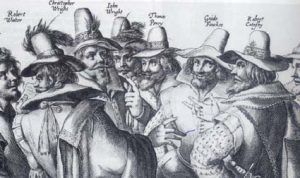
Francis Tresham was one the 1605 Gunpowder Plot conspirators. The part played in the plot by Francis Tresham is probably crucial in explaining why it failed – as it was Tresham who almost certainly sent a letter to Lord Monteagle warning him of the dangers of being in Parliament on November 5th – the day James I was a due to open Parliament.
Francis Tresham was born about 1567. He was the eldest of eleven children. Tresham was born into a family that had a long history. Elizabeth I had appointed his great-grandfather as Prior of the Order of St. John of Jerusalem. Tresham was educated at St. John’s College, Cambridge University – but he could not graduate because he was a Catholic. This personal rebuff may have served to harden his views against Protestants but it was the treatment of his father, also a Catholic that probably made him more extreme.
Sir Thomas Tresham, his father, was a strict Catholic. In August 1581, he was arrested and tried by the Star Chamber for harbouring a Catholic priest, Father Edmund Campion. Also arrested along with him was Sir William Catesby, his brother-in-law. Thomas Tresham was imprisoned in the Fleet and was also put under house arrest when he got out of the Fleet – totalling seven years. Tresham was arrested again in 1597 and 1599 for failing to pay the fines that were handed out to him.
Francis Tresham grew up embittered and angered by the treatment of his father. In June 1591, he was sent to prison for altering a summons. The original summons was changed so that it had the name of a tenant of the Tresham’s who owed them money. He was released from prison in December 1591.
In 1593, Tresham married Anne Tufton. Marriage did not calm Tresham and he got more and more into debt, said to have stood at £1000 in 1593. In 1596, Tresham was arrested once again when the government decided to round up known Catholic malcontents. Along with Tresham, also arrested were Christopher and John Wright and Robert Catesby. The arrests were more precautionary as opposed to being based on any known issues.
In 1601, Tresham was arrested for his part in the foiled rebellion to remove Elizabeth from the throne. He was fined £2000. To pay this fine, his father had to sell off some of his property. Sir Thomas died in 1605. Francis was his heir and he inherited many debts – estimated to be £11,500.
However, the Gunpowder Plot conspirators who had already grouped together did not know about Tresham’s lack of funds. His cousin was Robert Catesby and Tresham was invited to join the conspiracy. There is little doubt that Tresham had the motivation when the treatment of his father is considered. However, he did not have the finances that the others conspirators hoped that he would have.
According to Tresham’s confession, he was brought into the plot on October 14th, 1605. Both Guy Fawkes and Thomas Wintour stated in their confessions that he was the last to join the conspirators. It is said that originally Tresham tried to discourage the plan. He then supported the idea of giving a warning to Catholic members of the House of Lords. This led to the letter received by William Parker, Lord Monteagle, who was married to Tresham’s sister.
Tresham’s part in the plot in November 1605 has been a source of argument for years. On November 2nd, he was given a license to travel abroad for two years with two servants, three horses and £50. Why would a man previously arrested as a known Catholic malcontent be granted such a licence? When the news of the arrest of Fawkes reached the conspirators, they all quickly fled London – except Tresham. Was he feeding information back to the government?
If he was, this did not save Tresham from arrest. He was arrested on November 12th. On November 13th, Tresham wrote a five-page statement on his relationship with the conspirators and his part in the plot.
Tresham died in the Tower of London on December 22nd. Many thought that he died from poisoning while the official government version of the day was that he died from strangury – an acute inflammation of the urinary tract. In death, Tresham was treated like a traitor. His land was forfeited and his name was attached to the list of other conspirators who wanted to murder James I.